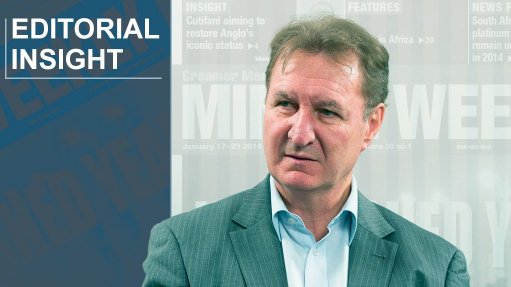
Last week’s Joburg Indaba proved a robust conference. Emanating from it were divergent opinions about the best way to deal with an errant Department of Mineral Resources (DMR) which has caused a myriad of distractions.
Had proper DMR leadership been in place, the South African economy would not have gone ex-growth.
Realisation of this is mounting and strong momentum is building up at private-sector level, where excellent leadership has been put in place.
I have watched the progress of Mxolisi Mgojo over many years and he is a shining light of the private sector, who is also able to bring the best out of the public sector.
As incumbent Chamber of Mines president, Mgojo is poised to preside over a total rebranding of the chamber plus constructive engagement with the public sector that will force the misaligned DMR back into line.
The DMR will have no option but to fall into line, under pressure from the rest of the economy which is increasingly cognisant of the fact that, when mining does badly, South Africa does badly.
At company level, Mgojo has shown how well he can work with State-owned rail enterprise Transnet. As CEO of the R40-million, 6 000-employee parastatal, Mgojo last week signed a very positive rail agreement with Transnet that releases more positive economic spin-off into the Waterberg coalfield area.
In the same week, as president of the chamber, Mgojo set in motion a far-reaching blueprint for ethical government leadership enshrined in a statutory and regulatory regime that benefits all the people of South Africa.
Mgojo committed the chamber to engaging positively with the likes of the State-owned Industrial Development Corporation and the Public Investment Corporation, as well as labour unions and communities.
His leadership is also aiming firmly at the crucial necessity of global competitiveness, which, of necessity, will see the universally rejected Mining Charter III bite the dust in its current form.
At the same time, there is growing cognisance of the rapid technology build-up that will require adjustment from all stakeholders.
The move of the world to mining in brand-new ways will make all of us do things differently. There is no escape from the march of progress.
Importantly, Mgojo emphasised the imperative that such progress remain people-centred, which is the mantra heard constantly from within the precincts of the new research campus in Carlow Road, Richmond, where a public and private partnership is unfolding in a way that will be a major positive for the country as a whole.
Despite a tough environment, South Africa should remain cognisant of mining last year achieving R424-billion in mineral sales, with 25% of South Africa’s exports having come from primary minerals. This increases to more than 40% when semi- beneficiated minerals are included.
With collective effort and an end to DMR blockages, South African mining has the potential to do infinitely better.